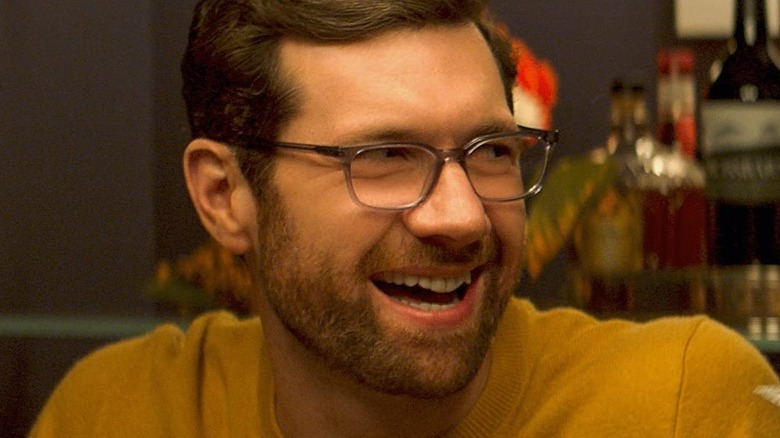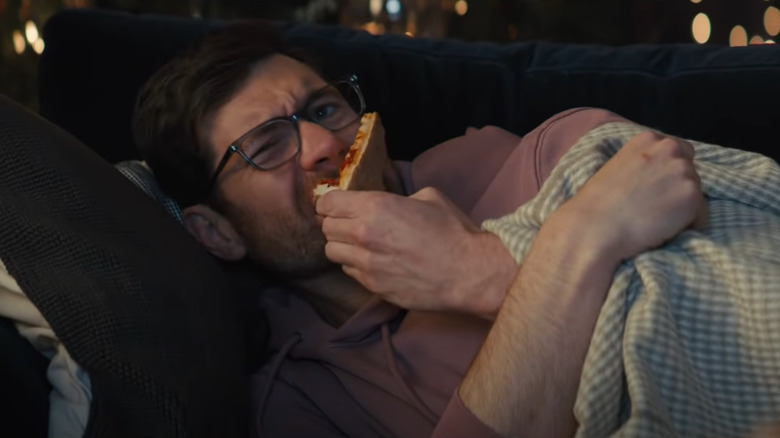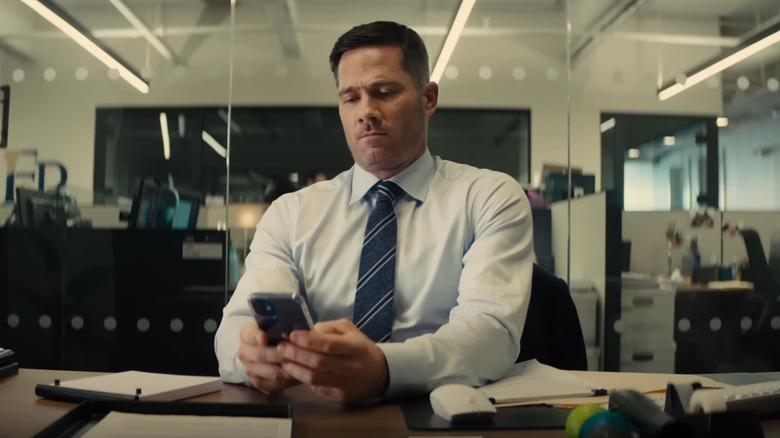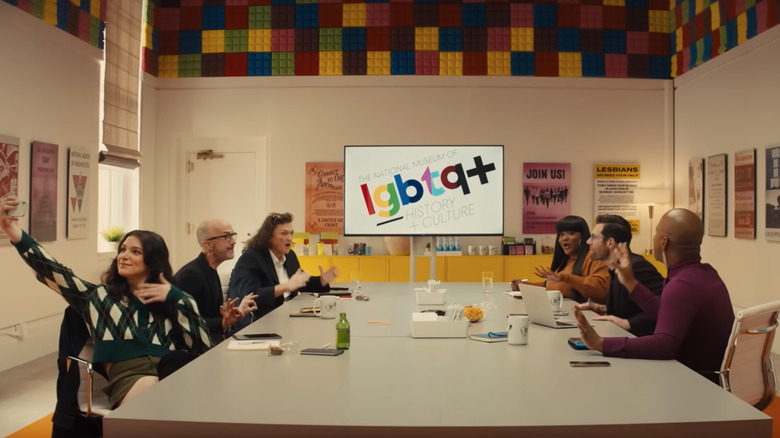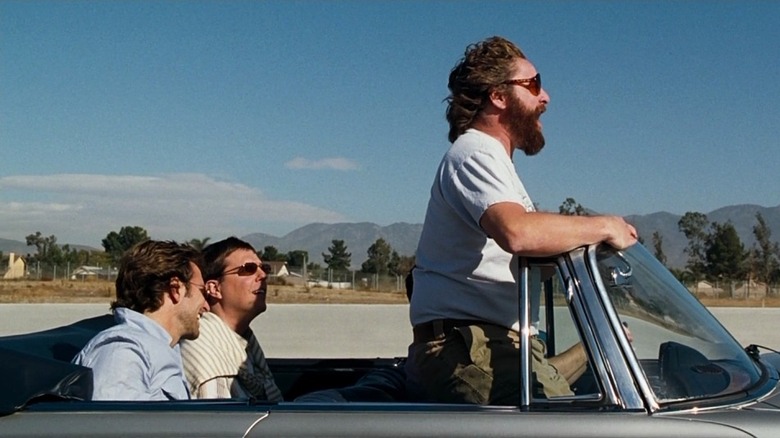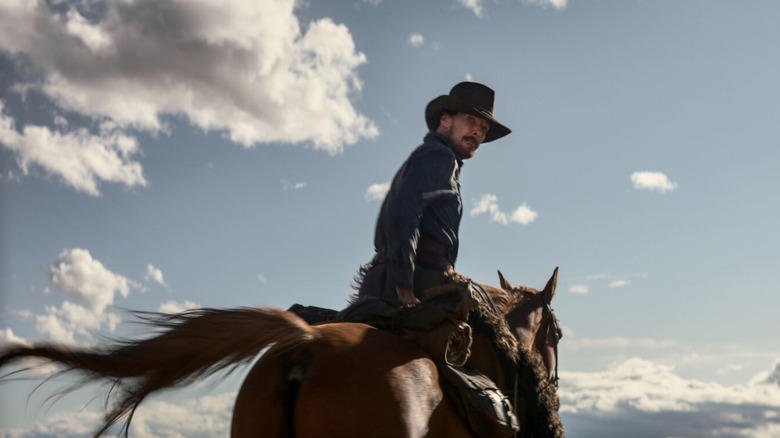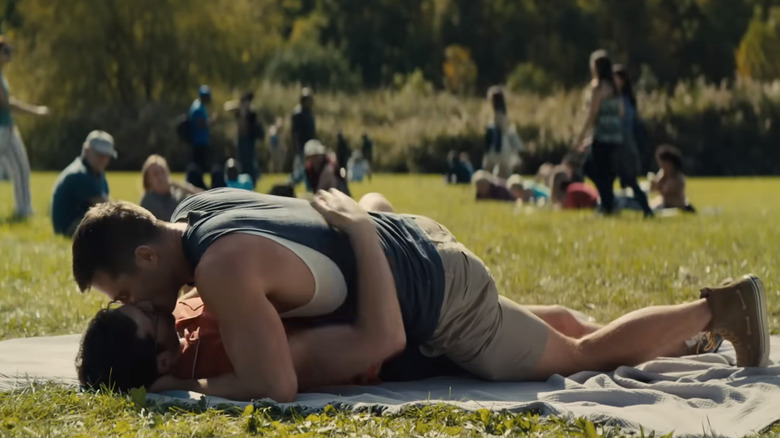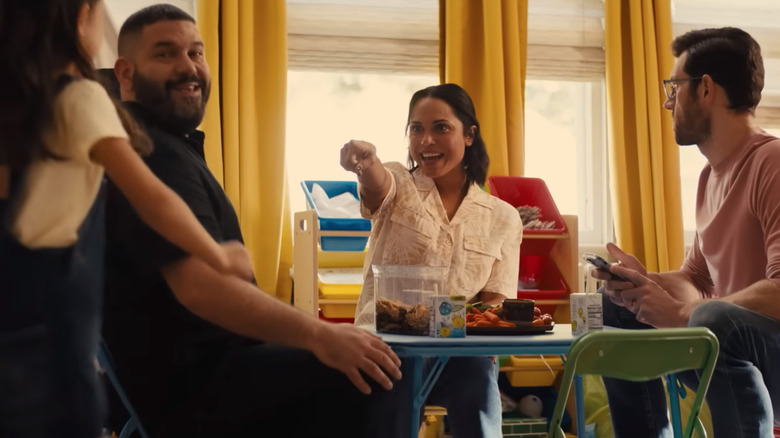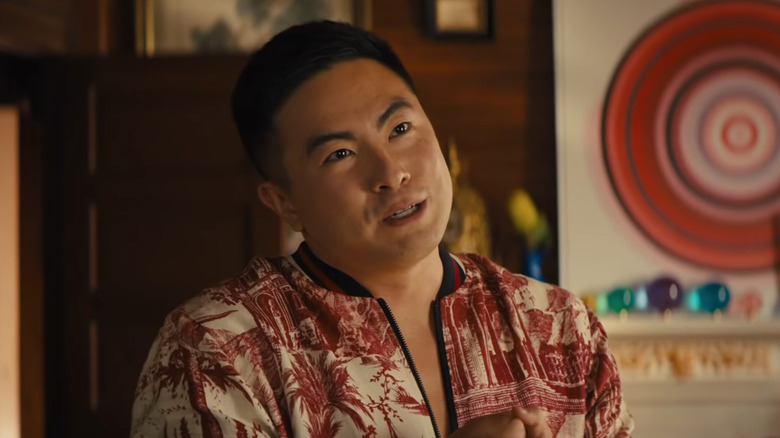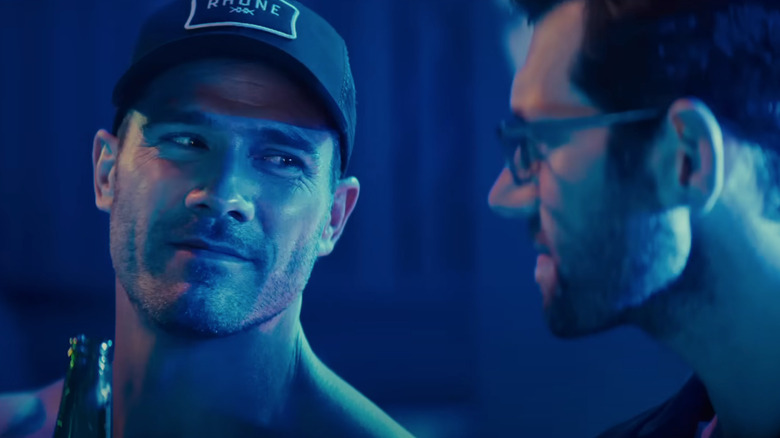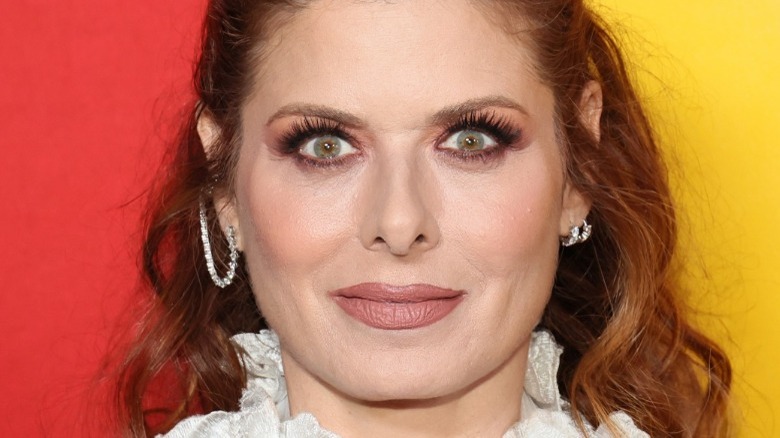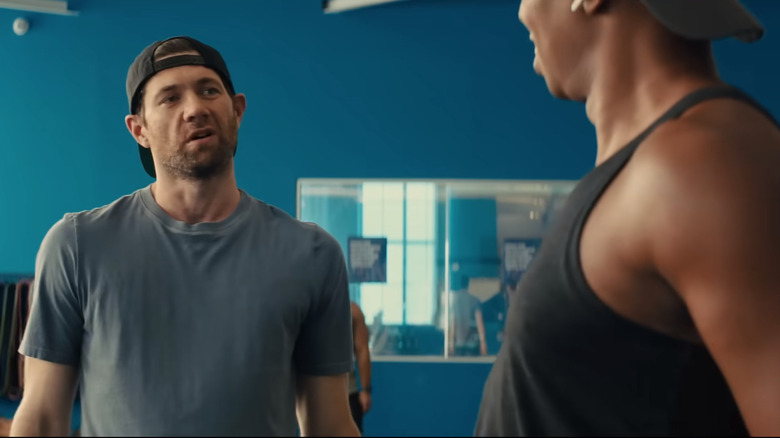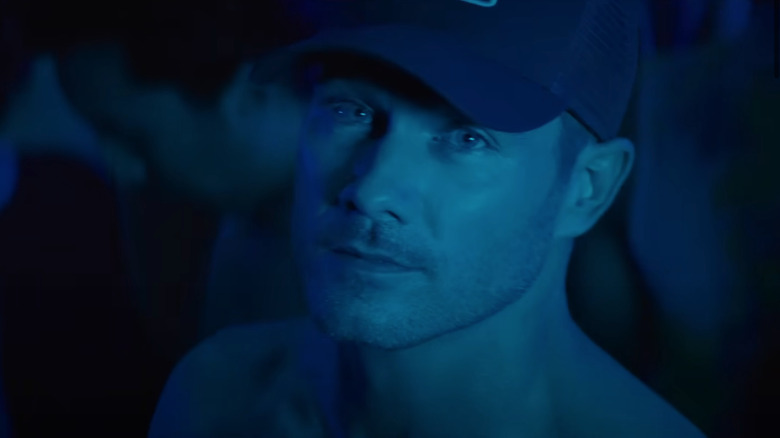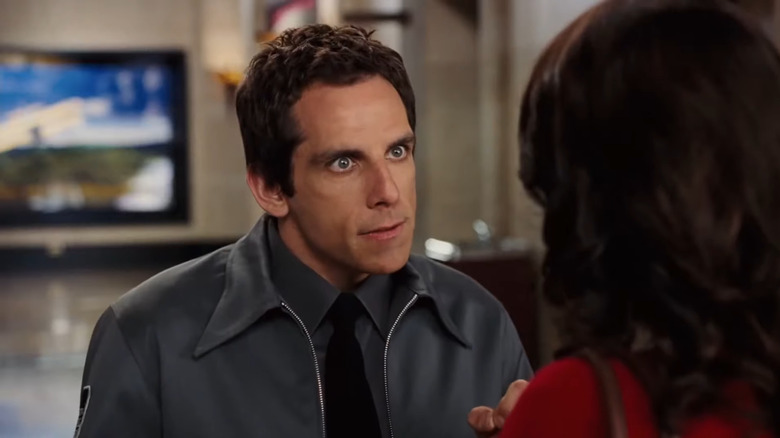The 13 Most Hilarious Scenes In Bros
This post contains spoilers for "Bros."
"Bros," directed by Nicholas Stoller from a script he co-wrote with "Billy on the Street" host and comedian Billy Eichner, plays like a classic romantic comedy, but of a kind we haven't seen nearly enough of on the big screen. This love story between Bobby Leiber (Eichner), a neurotic LGBTQ+ history podcaster, and Aaron (Luke Macfarlane), a buff masculine lawyer, is still extremely unusual in Hollywood as a far-too-rare theatrical release made primarily both by and for members of the LGBTQ+ community. Don't get us wrong — straight audiences will have a great time with "Bros" too, but it's the queer crowd that will be laughing the hardest due to just how relatable and true the film's observations are.
We'd argue that "Bros" is easily the best film produced by Judd Apatow since "The Big Sick" in 2017 and one of the funniest movies released so far in 2022. Over the course of its nearly two-hour runtime, "Bros" is filled with many funny scenes and lines we expect people to be quoting for a while. It's the following 13 gags, however, that stand out as the absolute funniest and most memorable parts of the film.
Inclusive Hallheart movies
"Bros" is very aware of the ways in which movie studios try to market to the LGBTQ+ community, specifically criticizing attempts to just force gay characters into the exact same stories they'd write for straight ones. Right in the opening scene, Bobby talks on his podcast ("The 11th Brick," the name itself a joke about when the first white guy might have joined in at the Stonewall riots) about rejecting an offer to write a gay romcom "that straight guys would enjoy," jokingly pitching a movie where he has sex with Jason Momoa while worrying about a volcano. Gay people's experience with romance, Bobby argues, is different from straight people's, and just switching different actors into the same formulaic tropes wouldn't be truthful.
The harshest and funniest satire on this topic is reserved for the Hallmark Channel's paint-by-numbers "inclusive" holiday movies. Hallmark gets spoofed as "Hallheart." On TV, Bobby sees ads for awkward attempts at bisexual ("Christmas With Either") and polyamorous ("A Holly Polly Christmas") Hallheart movies; posters he points and complains about on the street include "Have Yourself a Heteronormative Christmas" and "Miracle on 34th Street But There's One Gay Guy." The satire is extra funny knowing that Luke Macfarlane, the actor who plays Aaron, has starred in a dozen such actual Hallmark Christmas movies.
Texts and Grindr voiceovers
One running gag in "Bros" that consistently gets laughs is that whenever the characters text each other, their text messages are presented via the actors' voiceovers directly capturing the unconventional grammar and spelling of text conversations. This is particularly amusing when highlighting the absurdity of the characters' assorted attempts at hookups via Grindr, perhaps the most memorable of which occurs in one scene where Bobby is desperately and repeatedly texted "need ass pic" and has to struggle to get the exact right lighting as the guy he's texting with loses patience.
The ways in which Bobby and Aaron fret over the exact right messages to send to each other are both humorous and relatable while also telling a lot about their personalities (compare and contrast Aaron's self-satisfaction with sending a GIF from "The Office" with Bobby's eye-rolling response to this). "Bros" further emphasizes the reliance on cell phones in modern gay socialization and romance with a joke about a new app called "Zellweger," for men who just want to talk to each other about their favorite actresses.
Everything with the museum committee
In addition to podcasting, Bobby is part of a committee trying to determine the last exhibit needed for the opening of The National Museum of LGBTQ+ History and Culture (something which shamefully doesn't exist in real life yet). It's this particular subplot that will garner the biggest laughs from those involved with the queer activism scene. It's here where you can best tell that this film was made primarily by and for queer audiences because no movie made for straight people would derive so much humor from the queer community's constant in-fighting.
Bisexual man Robert (Jim Rash) and lesbian Cherry (Dot-Marie Jones) are constantly arguing over whose personal causes need more attention. Bobby's own controversial hot takes (for example, declaring that Abraham Lincoln was gay and that "Schitt's Creek" is overrated) just add to the group's tension. The committee's trans and gender nonconforming members have their own ways of dealing with all the tension: Angela (TS Madison) is a swing vote in various arguments, Tamara (Eve Lindley) is streaming everything even when it's inappropriate to do so, and Wanda (Miss Lawrence) passive-aggressively smiles and "holds space" for people they're clearly sick of. It's all a hilariously accurate portrait of the arguments that happen in queer spaces.
The Hangover argument
When Bobby and Aaron start seeing each other, Bobby is continually in disbelief at how a "straight-acting" guy could possibly be into him. One of the funniest bits of their first date involves Aaron intentionally screwing with Bobby by picking the "straightest" possible answer to answer the question of what his favorite movie is: "The Hangover."
Bobby is quick to launch into a rant about how some of the very first lines of Todd Philips' film, which became the highest-grossing R-rated comedy ever in 2009, involve the characters calling each other offensive homophobic slurs. Aaron passes this off like it's no big deal and doesn't bother him, which only ends up bothering Bobby even more, inspiring him to go on a rant about homophobia and representation in the media. Eventually, Aaron gives it away that "The Hangover" is not his favorite movie and that he just wanted to see how Bobby, a guy who in his own words only reads about "gay stuff and movies," would respond.
Making fun of Oscar bait
While "inclusive" Hallmark movies may be Billy Eichner's biggest target when it comes to mocking the state of queer representation in the media, he also saves some mockery for another, longer-lasting trend in LGBTQ+ cinema: prestige Oscar-bait films mostly starring straight actors trying to prove their range by playing queer characters for the sake of awards, at least partially aimed at making straight viewers feel progressive.
Bobby and Aaron go on a date to see one such movie, which is described as a drama about a closeted gay cowboy. The summary for this fictional film recalls both "Brokeback Mountain" and "The Power of the Dog," the former of which is name-dropped in a list of other "gay trauma" films and the latter of which is implicitly invoked when Bobby associates this genre with Benedict Cumberbatch trying to win awards (Cumberbatch was also Oscar-nominated for playing the gay computer scientist Alan Turing in 2014's "The Imitation Game"). One elderly woman's assessment of this film-within-the-film after leaving with her husband: "I liked it more than 'Call Me By Your Name,' but not as much as 'Dallas Buyers Club.'"
Aaron's wrestling fetish
There's a scene showcased heavily in the trailers and TV spots for "Bros" wherein Bobby, noticing that Aaron is staring at other muscular jocks playing sports in the park, teases him for wanting someone who plays rough and proceeds to wrestle him on their blanket. The athletes run over about to break up the fight, only to back off when the two men go from fighting to kissing. It's a funny scene in and of itself, but it's only the set-up to a scene that's even funnier — and a lot more R-rated.
"Bros" is delightfully forward in finding comedy in its many sex scenes, and one of the funniest follows this public wrestling PDA with some wrestling sex. It's easy to joke about how similar a lot of wrestling moves compare to sexual positions, but it's rare to see a mainstream movie actually go there as graphically as this one, providing big, audacious laughs while effectively building the relationship between the characters.
The overly supportive ally family
If there's one thing that makes "Bros" already feel dated, it's that the production couldn't have anticipated just how rapidly anti-LGBTQ+ state laws would spread in 2022. Today, many feel as if LGBTQ+ acceptance is backsliding (per Time), whereas "Bros" seems to be portraying a world where things are progressively getting better for the younger generation. Even so, that Bobby perceives his niece and nephew as growing up in an environment so radically supportive that it's awkward makes for some sharp laughs and characterization, as well as a realistic portrayal of alienation from someone whose own environment growing up was so much worse.
Bobby's sister, Tina (Monica Raymund), and brother-in-law, Edgar (Guillermo Díaz), are so utterly at ease discussing all things gay, even trying to assess if the problem with Bobby and Aaron's relationship is that they're both "bottoms" and then joining their kids in a "bottom dance," that Bobby frustratedly assesses, "Gay sex was more fun when straight people were uncomfortable with it." Another sad-yet-funny one-liner from Bobby when his extra-supportive ally family members talk about how many of their kids' classmates are openly queer: "We had AIDS and they had 'Glee.'"
Bowen Yang's trauma-coaster
Aaron's expertise as a lawyer comes in handy when he and Bobby take a trip to Provincetown, Massachusetts, to try to attract some wealthy donors for the LGBTQ+ history and culture museum. Bobby has little patience for this crowd, but Aaron knows that the way to convince rich people to donate tons of money is to give them what they want. In the case of Lawrence Grape, one such wealthy donor played by Bowen Yang, what he wants is an amusement park ride in the museum.
Grape's "trauma-coaster" idea essentially presents the last 50+ years of LGBTQ+ history as a bizarre funhouse horror show, with animatronic recreations of the Stonewall riots and Ronald Reagan jump-scares before eventually easing out on "something happy, like Lil Nas X lifting pink dumbbells." The pitch is wacky enough, but against Bobby's instincts, they go along with it. The gag returns at the end of the film where we get to see part of the finished "trauma-coaster" in action, with Grape on a video screen warning riders they're about to experience the Trump administration.
The foursome
Bobby has enough trouble imagining himself as part of a couple that he doesn't get why on Earth his friends would want to form a "throuple," but that doesn't mean he doesn't get into some comically awkward polyamorous group sex later on. At a party, Aaron is showing interest in doing it with a childhood friend who recently came out of the closet, but he still feels an obligation to be with Bobby (and also a fourth guy wants to join in). Cue the foursome.
"Bros" already featured one of the funniest cinematic sex scenes in recent memory with the wrestling scene, so including this comedic foursome as well secures the film as one of the most sex-positive yet also hilarious romantic comedies in a long time. The punchline, with another one of Bobby's friends checking in and recognizing the fourth guy as one of his own hookups, is a knowing joke about how it can feel like everyone seemingly knows everyone within the gay scene.
Debra Messing's cameo
A big deal has been made about "Bros" being cast almost entirely with queer actors (via Variety), even for heterosexual cisgender characters, but there are a few exceptions in the film, all of which are straight ally celebrities playing themselves — including Kristen Chenoweth and Ben Stiller. The most prominent of these ally cameos is from Debra Messing, most famous for playing Grace Adler on the NBC sitcom "Will & Grace," which ran from 1998 to 2006 (with a revival from 2017 to 2020) and broke ground for featuring two major gay characters.
When Bobby encounters Messing outside one of the planning meetings for the museum, he immediately starts asking her for advice on his relationship issues with Aaron. Messing, as portrayed here, is fed up with gay men treating her as if she's her character from "Will & Grace" and constantly asking her for advice. When the rest of the museum board goes out to see what the commotion is about, Messing asks the women if they have any personal problems they want to talk to her about. The women all decline, to which Messing remarks that "Lesbians have their s*** together!" At the end of the movie, it's a sign of Bobby's character growth when he declines the opportunity to talk with Messing about his personal issues.
Bobby bros out
After Bobby's fails to dial down his normal in-your-face personality in front of Aaron's not-quite-progressive family, resulting in some heated arguments and major embarrassment, Bobby starts trying to see if he could act like the sort of "bro" he thinks Aaron would naturally be more attracted to. Of course, these attempts all go amusingly awry.
Bobby tries using steroids without realizing that if he's not actually working out, the drugs are just going to make him angry and irritable, resulting in some self-aware yet deeply embarrassing moments of "roid rage." When Bobby does end up going to the gym to work out, he puts on a different voice and actually manages to hook up with one of the gym bros ... only to slip into his ordinary voice while in bed and completely freak out his hookup. It's at this point the "trying to be someone else" charade completely falls apart — and finding out that his gym bro hookup is also a Barbara Streisand fan helps Bobby ease his insecurities about being his flamboyant self.
Aaron's love of tiny chocolates
Though Aaron might fit societal standards of masculinity much more easily than Bobby, that doesn't mean it's not something he struggled with. In one bedtime conversation, he reveals he never wanted to be a lawyer but did so because he felt ashamed of his actual passion in life: making tiny chocolates. Bobby laughs about the reveal at first, but Aaron's "tiny chocolates" subplot leads to be a sweet journey of self-acceptance in addition to a vehicle for comedy.
During the requisite rom-com conflict period where Bobby and Aaron have temporarily stopped seeing each other, Aaron decides to finally put in the work to make his chocolatier dreams a reality. He makes a bunch of LGBTQ+-themed treats to support the launch of Bobby's museum, including tiny flag candies, pink triangle chocolate boxes, and such punny concoctions as "Harvey Milk Duds" (a reference to Harvey Milk, the first openly gay politician in California and one of the most famous gay rights activists of the 1970s).
Night at the Museum
In the middle of the film, when Bobby is showing off the unfinished museum to Aaron, he asks for suggestions about what could go in the museum's final wing. Aaron humorously suggests that they do some sort of recreation of the "Night at the Museum" movies, where the things in the museum come alive and talk to you. At the end of the movie, almost every previously pitched idea, from Robert's animatronic Hall of Bisexuals to Lawrence's trauma-coaster, makes its way into the finished museum — and the last of these ideas we get to see before the end of the movie is Aaron's "Night at the Museum" proposal.
This exhibit is handled via holograms, and this is where the rest of the film's straight ally cameos come in. Ben Stiller, star of the "Night at the Museum" movies, is the host of the exhibit. Bobby initially suggested Amy Schumer playing Eleanor Roosevelt as sarcasm, but there she is at the end of the movie doing exactly that, and Kenan Thompson gets to play James Baldwin.
